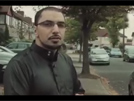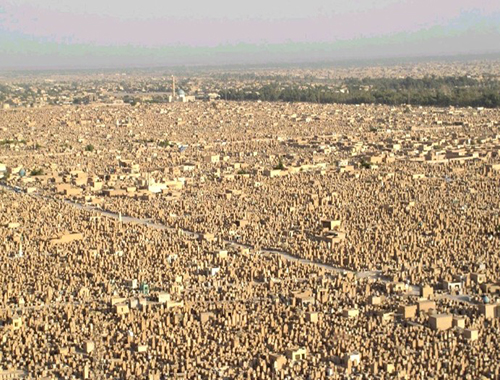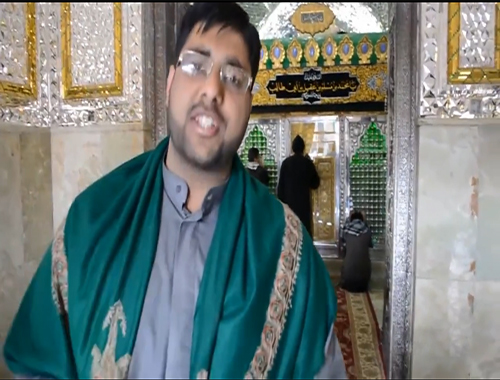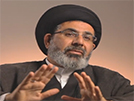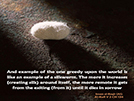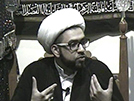Detailed Answer
- Details
- Hits: 2109
Detailed Answer
The life of Al-Mahdi (ع) is an enigmatic issue, and therefore questions relating to it might not be answered definitively, although one can arrive at probable answers by studying the hadiths that have been related in this regard.
One of the questions pertaining to Imam Zaman’s (ع) life is whether he has a family. There are three possible answers to this question:
a) that he never married;
b) that he married but has not fathered children;
c) that he does in fact have children.
The implication of the first possibility would be his abandonment of a very important religious practice, which is hence very unlikely. Of course, it might be countered that the issue of his occultation and its secrecy are of utmost importance and thus marriage—which although important is not nearly as important—can be abandoned. This contention however is not acceptable, for marriage and the secrecy required during his occultation are in no way at odds.
The second possibility, although free of the problem with which the previous possibility is faced, raises another question: Has he married only once—hence is his wife sharing his unusual longevity—or has he been married to multiple wives? There is no evidence to support either side, but it would not be unlikely if the latter were correct. The problem which this might bring to mind is the possibility that his identity might be revealed. However this might pose a serious problem, for according to the hadiths, in his occultation it is his identity as the twelfth imam from the progeny of Muhammad that must be kept secret, which would not be jeopardized by personal relations if the people whom he is in contact with be unaware of his status as such.[242]
The same question can be addressed in the case of the third possibility. This possibility however is faced with an additional problem: If the Imam did in fact have children, they would sooner or later decide to search for their true identity which might in turn jeopardize Imam Zaman’s (ع) secret mission.
There are however no ahadith that specifically verify any of these three possibilities. As to further accentuate the dilemma, there is a hadith that has been related through two chains of transmitters with one consequential word differing in the two versions. One version related by Shaykh al-Tusi reads, “Imam Ja’far b. Muhammad as-Sadiq (ع) said, ‘No one of his children (wuldihi) or anyone else would know his whereabouts.’”[243]
In the other version related by Nu’man, the hadith reads, “No one from his friends (wali) or anyone else would know his whereabouts.’”[244]
Thus due to this discrepancy, there is no reason to prefer Shaykh al-Tusi’s version. On the contrary, Nu’man’s version seems more preferable in terms of its chain of transmitters and the wording itself. For instance, in Shaykh al-Tusi’s version there is a third person singular pronoun (ghayrihi) which seems to be incorrect as its antecedent is plural (wuldihi) which is unjustifiable, except if accounted for according to the following three possibilities:
1. That this mistake is attributable to the scribes;
2. That the hadith is indicating that the Imam only has one son;
3. Or that the hadith is not specifying whether he does in fact have a child or not but that if he did, the secrecy of his mission in occultation is so paramount that even his child wouldn’t know him.
Moreover, the chain of transmitters is faulty, which even if this could be overlooked, another issue would be that it is unclear whether the hadith is about the time of occultation or is referring to the period after his reemergence.
There are two other hadiths that complicate the controversy. One is a prayer narrated by Ibn Tawus from Imam ‘Ali b. Musa al-Rida (ع): “O Allah, grant him [i.e. the Twelfth Imam] in regard to himself, his family, his children, and his progeny …”[245]
The other hadith is related from Imam Ja’far b. Muhammad as-Sadiq (ع): “It is as though I see the Qa`im [i.e. the Twelfth Imam] in the Mosque of al-Sahlah with his family accompanying him.”[246]
Some have cited the story of the “Green Isle” to claim that the Imam (ع) has a family and numerous children who reside on the isle and have it all to themselves. This story however is only a myth. It is more akin to a tail of fiction than to reality. ‘Allamah Majlisi who has narrated this story explains, “Since I did not find this story in any of the reliable books, I have brought it in a separate chapter.”[247] Shaykh Aqa Buzurg Tehrani asserts that this tale is a fabrication.[248]
Hence, although it is possible that Imam Zaman (ع) has a family, it is not verifiable, as there are no authentic hadiths to the point. On the other hand, there does not seem to be any good reason why Imam Zaman (ع) would abandon the religious practice of marriage.
Where does the Imam reside? There are three groups of hadith in this regard that at first glance might seem contradictory. The first group do not specify a location but rather say that the Imam is itinerant in mountains and deserts—such as the hadith narrated by Ibn Mahziar and which Shaykh al-Tusi has recorded in his Ghaybah.[249]
The second group are those that point to a specific location as to where the Imam resides. These hadiths are divergent however in regard to where that location exactly is. Some of these hadiths mention the city of Medina or more specifically Mount Razawi which is located on the outskirts of the city.[250] In reference to such ahadith ‘Allamah Shushtari writes,
It has been ascertained in authentic hadiths that the Imam’s residence in both the major and minor occultations is Mount Razawi. And the fact that the Kisaniyyah claim it as the headquarters of Muhammad Hanafiyyah does not negate its being where the Imam resides. For, the Kisaniyyah had based their belief on the numerous accounts in which the Prophet (ص) had prophesied the coming of the Al-Mahdi, his occultation, etc., but had erroneously accepted Muhammad Hanafiyyah as the promised Al-Mahdi. And generally, all deviations and aberrations stem from a truth which has been wrongfully understood or manipulated.[251]
A number of these hadiths however point to an area around Mecca—namely, Zu Tuwa—as the residence of the Imam and where he will begin his revolution alongside his companions.[252]
The third group of hadiths also lacks any allusion to a specific location but points out that the Imam does in fact interact with other people normally but without being identified.[253] On examining the three groups more carefully it becomes clear that there is no discrepancy between them. The Imam leads a normal life without arising any suspicion. This mode is the most convenient for the Imam. And this is in no way at odds with him being in Mecca or occasionally retreating to mountains and uninhabited regions in urgent circumstances.
What is the Imam’s (ع) diet comprised of and what type of dress does he wear? As mentioned above, the Imam lives a normal life. However the hadiths indicate that he contents himself with the minimum of food and the simplest of clothing. In his Kitab al-Ghaybah Nu’mani narrates a hadith from Imam Ja’far b. Muhammad as-Sadiq (ع) and Imam ‘Ali b. Musa al-Rida (ع) which addresses the above question: “He only wears coarse clothing and eats unpalatable food.”[254]
In another hadith he is related to have said, “His clothing is rough and coarse, and his food is bread made from barley.”[255]
How can one make sense of the common practice of praying for Imam Zaman’s (ع) health when Allah (awj) has guaranteed it?
Praying for the Imam of the Age (ع) is a religious practice that necessarily has its particular wisdom, which though beyond our comprehension, nevertheless exists. Just as when our doctor prescribes a medicine for us, whose precise nature and effects we might not know, yet it is not without reason, for he knows what he is doing. At any rate, we are to comply with the exhortations of our religious authorities whom we trust and it is this trust that assures us that there must be some wisdom behind praying for the Imam’s health.
There are however certain points that might shed some light on this enigma. Firstly, one of the means by which the Imam’s (ع) health is maintained is through the prayers of the believers. This however should not be understood to imply that if we cease to pray, his health would be jeopardized, for there are at all times some believers who pray for his wellbeing. Allah (awj) always has some agents in store to carry out His missions. This is similar to the scenario of some believers renouncing their faith. In such a case the Divine religion will not perish. Rather Allah (awj) will entrust the religion to another group who will safeguard it:
“So if these disbelieve in them, We have certainly entrusted them to a people who will never disbelieve in them.”[256]
That is, if we as guardians of the divine religion—which would indeed be a great honour for us if it were so—abandon our duty, Allah (awj) will replace us with another community that would shoulder the duty faithfully. Or for instance, according to the general rule there is always the camp of evil, but it is one’s own choice to decide to be in that camp—like in the case of Shimr who became so base and evil that he carried out the barbarous and unimaginable sin of slaying Imam Husayn b. ‘Ali (ع) —or not.
The second point to mention in this regard is that it is very likely that the prayers of the believers are efficacious at least in relieving the Imam (ع) of minor ailments. For what has been guaranteed by Allah (awj) is his life, and not his being free of any and all ills and distresses. It is in this way that our prayers could be of help and this is in no way against Allah (awj)’s will.
Notes:
[242] It is narrated from Imam Ja’far b. Muhammad as-Sadiq H that “…{he} will go around amongst the people, pass through their shops and markets, and {even} step onto their carpets but they will not know him…” (Muhammad b. Ibrahim al-Nu‘mani, Kitab al-Ghaybah, p. 164.
[243] Kitab al-Ghaybah, pg .162
...لاَ يَطَّلÙع٠عَلى مَوْضÙعÙه٠أَØَدٌ Ù…Ùنْ ÙˆÙلْدÙÙ‡Ù ÙˆÙŽ لاَ غَيْرÙÙ‡Ù...
[244] Kitab al-Ghaybah, pg. 172
...لاَ يَطَّلÙع٠عَلى مَوْضÙعÙه٠أَØَدٌ Ù…Ùنْ ÙˆÙŽÙ„Ùيّ٠وَ لاَ غَيْرÙÙ‡Ù...
[245] Jamal al-Usbu‘, pg. 312:
...ÙˆÙŽ أَعْطÙÙ‡Ù ÙÙيْ Ù†ÙŽÙْسÙÙ‡Ù ÙˆÙŽ أَهْلÙÙ‡Ù ÙˆÙŽ ÙˆÙلْدÙÙ‡Ù ÙˆÙŽ Ø°ÙرÙّيَّتÙÙ‡Ù...
[246]Bihar al-Anwar, vol. 52, pg. 317:
...Ú©ÙŽØ£ÙŽÙ†Ùّيْ أَرَی Ù†ÙزÙوْلَ الْقَائÙÙ…Ù ÙÙيْ مَسْجÙد٠السَّهْلَة٠بÙأَهْلÙه٠وَعÙيَالÙÙ‡Ù...
[247]Bihar al-Anwar, vol. 52, pg. 159
[248]al-²ari‘ah Ila Tasanif al-Shi‘ah, vol. 5, pg. 108
[249]al-Ghaybah, pg. 266
[250] al-Kafi, vol. 1, pg. 340
[251] The Series of Articles and Saying Regarding the Imam Mahdi, pg. 64
[252] Kitab al-Ghaybah, pg. 182
[253] Kitab al-Ghaybah, pg. 164 – The translation of this hadith was mentioned in the first footnote. It indicates that he lives amongst all others except that they don’t know him.
[254] Kitab al-Ghaybah, pg. 233:
...Ùَوَالله٠مَا Ù„ÙبَاسÙه٠إلاَّ الْغَلÙيْظَ وَمَا طَعَامÙه٠إلاَّ الْجَشَبَ...
[255] Kitab al-Ghaybah, pg. 234:
...وَالله٠مَا Ù„ÙبَاسÙه٠إلاَّ الْغَلÙيْظَ وَمَا طَعَامÙه٠إلاَّ الشَّعÙيْرَ الْجَشَبَ...
[256]Surat al-An‘am (6), Verse 89:

